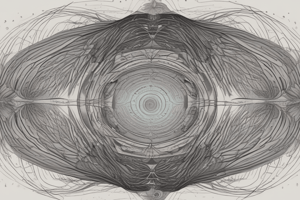Podcast
Questions and Answers
What is the difference between sensation and perception?
What is the difference between sensation and perception?
Sensation involves detecting and transmitting energy to the central nervous system, while perception is the organization and interpretation of sensory information by the brain.
Define attention in the context of cognitive psychology.
Define attention in the context of cognitive psychology.
Attention is the selective processing of incoming sensory information, allowing focus on certain stimuli while ignoring others.
What is the function of memory in cognitive psychology?
What is the function of memory in cognitive psychology?
Memory involves storing and retrieving information, with long-term memory holding facts, events, skills, and habits for extended periods.
How does sensation contribute to cognitive processes?
How does sensation contribute to cognitive processes?
Explain the significance of attention in cognitive psychology.
Explain the significance of attention in cognitive psychology.
How does memory influence problem-solving in cognitive psychology?
How does memory influence problem-solving in cognitive psychology?
What is categorization and why is it important?
What is categorization and why is it important?
How does learning occur according to cognitive psychology?
How does learning occur according to cognitive psychology?
Why is understanding language and communication important in cognitive psychology?
Why is understanding language and communication important in cognitive psychology?
What are some examples of cognitive functions related to thinking?
What are some examples of cognitive functions related to thinking?
How do cognitive functions like problem-solving benefit individuals?
How do cognitive functions like problem-solving benefit individuals?
What opportunities for research and investigation do cognitive functions provide?
What opportunities for research and investigation do cognitive functions provide?
Study Notes
Cognitive Functions in Cognitive Psychology
Cognitive psychology is a branch of psychology that focuses on understanding mental processes such as thinking, perception, memory, and problem-solving. It seeks to understand how these processes are organized and how they interact to create the experience of conscious thought. This article will explore some of the key cognitive functions studied within cognitive psychology.
Sensation and Perception
Sensation involves the detection and transmission of energy from external sources to the central nervous system. It is the process by which the body recognizes a signal, such as light or sound, and converts it into a neural code. Perception, on the other hand, is the organization and interpretation of sensory information by the brain, allowing us to make sense of the world around us.
Attention
Attention refers to the selective processing of incoming sensory information. It allows us to focus on certain stimuli while ignoring others, enabling efficient processing of relevant information. Studies on attention have shown that it plays a crucial role in task performance and memory retention.
Memory
Memory is the process of storing and retrieving information. Long-term memory holds facts, events, skills, and habits for extended periods, while short-term memory stores information temporarily. Working memory is responsible for holding and manipulating information needed for solving immediate tasks.
Categorization
Categorization is the mental process by which objects, concepts, and experiences are grouped together based on common features or attributes. It helps in organizing information and understanding relationships between different entities.
Learning
Learning involves acquiring new knowledge, skills, and behaviors through experience. It encompasses both explicit instruction and implicit learning, where individuals learn without conscious effort. Cognitive psychology studies the processes involved in learning, including perception, attention, memory, and problem-solving.
Language and Communication
Understanding language and communication is essential for effective interpersonal interactions. Cognitive psychology examines how humans encode, decode, store, and retrieve verbal and nonverbal information, ultimately leading to improved communication strategies.
Thinking
Thinking includes various processes such as problem-solving, decision-making, and reasoning. These cognitive functions allow us to analyze situations, generate solutions, and evaluate outcomes. Studying thinking helps in developing strategies to improve these processes and enhance overall cognitive efficiency.
These cognitive functions highlight the breadth and depth of cognitive psychology's scope, providing ample opportunities for further research and investigation.
Studying That Suits You
Use AI to generate personalized quizzes and flashcards to suit your learning preferences.
Description
Explore key cognitive functions studied within cognitive psychology, including sensation, perception, attention, memory, categorization, learning, language, communication, and thinking. Discover how these processes shape human cognition and behavior.




